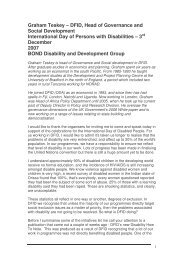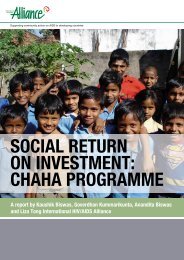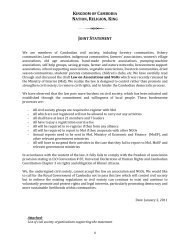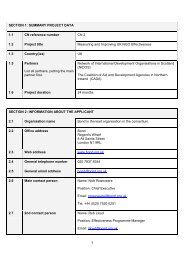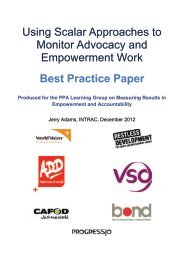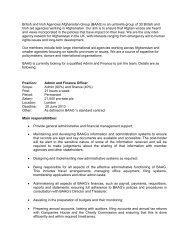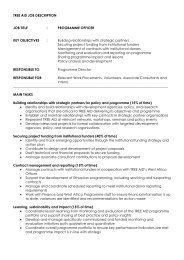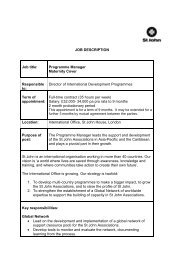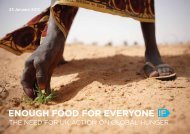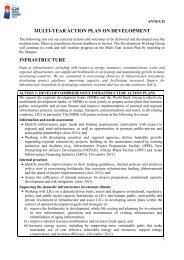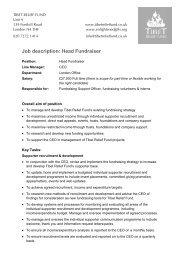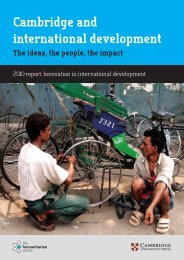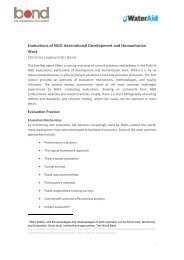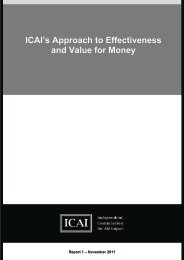Here - Bond
Here - Bond
Here - Bond
- No tags were found...
Create successful ePaper yourself
Turn your PDF publications into a flip-book with our unique Google optimized e-Paper software.
Learn with <strong>Bond</strong>Spring 2013 courses in central LondonGet 10% off any course booked before 1 March 2013quoting code 5PN113Project planning using a logicalframework approach6-7 FebruaryGet the best result from using alogical framework to plan a projectwith this step by step guidethrough the process.Monitoring and evaluation inmore depth11-12 FebruaryGo further into the differentmethods, practise using aselection of tools and startplanning which to use in yourown work.Advocacy essentials13 FebruaryAn introduction to thedifferent approaches to policywork, lobbying and publiccampaigning, and the skillsyou will need.Building better north/southpartnerships26 FebruaryLearn how to make the best ofprogramme partnerships withsouthern organisations.EU corridors of power4-5 MarchFind out how the EU works nowthe changes brought in by theLisbon Treaty are in place, andwhere you can have the greatestinfluence.Guest speakers share theirinside knowledgeManaging EC contracts andreporting on EC grants6-7 MarchAn essential guide to what theStandard Contract says, what itmeans and how to keep records,deal with procurement rules,report to the EC and manage thecontract with your partners.NEW: Theory of changeessentials11 MarchThis way of understanding howchange happens helps you focuson what really matters – yourunique contribution todevelopment.Impact assessment: whatdifference did we make?12-13 MarchGet a clear conceptual overviewand practical guidance ondesigning a simple, user friendlyand useful impact assessmentprocess.UK corridors of power18-19 MarchUnderstand how UK policy ismade and put into practice,who to target and how to influencethe political process.Guest speakers share theirinside knowledgeFundraising from trusts andfoundations19-20 MarchUnderstand how trusts work andthink, and how to get them to givethrough building relationships andwriting persuasive applications.Outcome mapping25-26 MarchFind out what is special aboutoutcome mapping, and how touse it to understand changes inthe behaviour of the people youwork with.Fundraising from institutions:writing winning proposals27-28 MarchThe essential steps in puttingtogether a two-stage fundingproposal to DFID, the EuropeanCommission, Comic Relief andBig Lottery Fund.If you don’t see the course you want online, contact us: learn@bond.org.ukFull details of courses toJuly 2013 and how to book:bond.org.uk/learnE-updates and special offers:bond.org.uk/e-updatesGet <strong>Bond</strong> trainingin-houseOur in-house training serviceis tailor-made for yourorganisation. We work withyou to build a course thatfits your exact needs andbudget, and we can delivertraining across the UK andworldwide. We also offerconsultancy support.bond.org.uk/in-house020 7520 0242learn@bond.org.uk“It’s cost effective andenables a number ofcolleagues to do thecourse together whichenhances the learningexperience.”World VisionEFFECTIVENeSS | Assessing the 29quality of evidenceAssessing thequality of evidence<strong>Bond</strong>’s new Evidence Principles provide acommon standard for evidence, helpingNGOs to ensure that they base their decisionson robust evidence of what works.NGOs strive to invest in interventionsthat make the biggest difference to thelives of poor and marginalised people.It’s therefore vitally important that thedecisions they make are based onstrong and rigorous evidence. This canbe a challenge especially in areas suchas empowerment or accountabilitywhere measurement can be difficult.The <strong>Bond</strong> Evidence Principles aimto address this challenge by providing acommon quality standard for evidencewhich is relevant and practical to thescale of NGO operations and can beused to measure, learn from anddemonstrate impact.The Principles1Voice and Inclusion: theperspectives of people living inpoverty, including the mostmarginalised, are included in theevidence, and a clear picture is providedof who is affected and how.2Appropriateness: the evidence isgenerated through methods thatare justifiable given the nature of thepurpose of the assessment.3Triangulation: the evidence hasbeen generated using a mix ofmethods, data sources, andperspectives.4Contribution: the evidenceexplores how change happensand the contribution of theintervention and factors outside theintervention in explaining change.5Transparency: the evidencediscloses the details of the datasources and methods used, the resultsachieved, and any limitations in thedata or conclusions.Each principle has a checklist of fourquestions that tests the quality of a pieceof evidence on a 1-4 scale:1. weak evidence2. minimum standard3. good practice4. gold standardAn overall score and colour (red, amber,yellow or green) is then assigned to eachprinciple to provide a picture of therobustness of a piece of evidence.The evidence principles can beused on:■■Evaluation reports■■Case studies■■Annual reviews to donors■■Research studies■■Designing or setting the terms ofreference for any of the above.The pilotThe pilot phase runs to the end of May2013 and we would especially like thefollowing organisations to get involved:■■NGOs of all sizes, ideally using the toolcollaboratively with south-basedpartners■■NGOs working in internationaldevelopment, humanitarian aid,advocacy, capacity building and workwithin with fragile states■■Donors, fund managers, andprogramme evaluatorsFor full details about the pilot andto download the pilot pack:bond.org.uk/effectivenessand click on ‘Principles’Next stepsThe pilot to test the NGO EvidencePrinciples will end on 31 May 2013,after which the findings will bediscussed by the group leading thework, which includes representativesfrom international NGOs of all sizesand sector donors. They will considerwhether any improvements can bemade and how best to market thePrinciples within the sector.If you have any questions,please contact us:ngoeffectiveness@bond.org.uk020 7520 1042bond.org.ukthe networker 103 | January – March 2013



